
The Tie Goes To The Buckeye
Ties – and sometimes breaking them – were common for Dave Albritton of Ohio State.
But there was no breaking any of the ties in Albritton’s three-straight NCAA high jump victories, and his first in 1936 was historic as he and Buckeye teammate Mel Walker became the first Black athletes to win the event.
That duo was part of an amazing Ohio State team in 1936: They contributed two of the record seven NCAA titles the Buckeyes won that year, joined by Jesse Owens with four (100, 200, 220 hurdles and long jump), along with Charlie Beetham in the 800 meters. No program has matched that number of champions in one NCAA meet.
However, the 1936 NCAA Championships was bittersweet for the Buckeyes, whose 73 points made them the highest-scoring runner-up team in meet history (6-place scoring system). The winning squad was powerful Southern California with 103⅓ points. The bittersweet part was that just a week earlier, Ohio State tied the Trojans in a dual meet when only wins counted, 7½-7½ – the fraction coming in the high jump, where Albritton tied USC’s Delos Thurber.
Albritton’s level of tying made a major leap a month later. A week after finishing third at the AAU Championships (on a tiebreaker), Albritton clinched a spot on the Olympic team in a brand-new stadium at Randalls Island, New York, by – you guessed it – tying Cornelius Johnson of Compton Junior College – who had won the AAU meet – as both cleared a world-record 6-9¾ (2.08m). That tie was not broken.
At the Berlin Olympics, Johnson led a 1-2-3 U.S. sweep, with Albritton earning the silver medal over Thurber’s bronze on a jump-off. Johnson and Albritton thus became the first Black athletes to medal in the Olympic high jump.
In the 1937 NCAA Championships, another Buckeye was favored – but this time it was Walker after sweeping the indoor and outdoor Big Ten titles over Albritton (and setting a world indoor best of 6-9¾ as well). Albritton came through, though, tying Colorado’s Gil Cruter for the win – Thurber was third on a tiebreaker as all three cleared 6-6¼ (1.99m). Walker, a senior, finished fourth but later in the summer raised the world record to 6-10¼ (2.09m).
Albritton and Cruter returned in 1938 as the meet record – 6-7¼ (2.01m) from 1926, then the oldest on the books – was battered like never before or since. In all, six men equaled the old standard as two – Albritton and Cruter – broke it with 6-8¾ (2.05m) clearances and tied yet again as neither succeeded at attempts at a possible WR of 6-10⅜ (2.09m).
Post-collegiate success followed for Albritton, as he won five AAU national titles – the last in 1950 at age 37. Ten years after that, Albritton was elected to the Ohio House of Representatives, serving six terms and becoming the first Black person to chair a House committee in 1969.
The NCAA and collegiate track & field will mark a momentous milestone in the spring of 2021 -- the 100th anniversary of the NCAA Championships and with that, the NCAA Track & Field Championships. In June 1921, the University of Chicago hosted the first track & field championships in NCAA history.
This point can’t be emphasized enough: Not only was the event the first for NCAA track & field, but the first championships for any sport under the sponsorship of the NCAA.
To celebrate, over each of the next 365 days, the U.S. Track & Field and Cross Country Coaches Association (USTFCCCA) will celebrate moments, student-athletes, and coaches that have made a century’s worth of championships special. From humble beginnings to important historical milestones to the modern-day, collegiate track & field has evolved with the American society.
The 2021 edition of the NCAA Division I Outdoor Track & Field Championships begin with preliminary round action on May 27-29 in Jacksonville, Fla., and College Station, Texas. The championships final site and culmination of the celebration is slated for June 9-12, 2021 at the newly rebuilt Hayward Field in Eugene, Ore.

Cal’s Hudson Wins Epic Triple Jump With World’s Best
On this day in 1987, Sheila Hudson of California set world best in Women’s Triple Jump at the NCAA Division I Outdoor Track & Field Championships when she bounded 13.78m (45-2½).
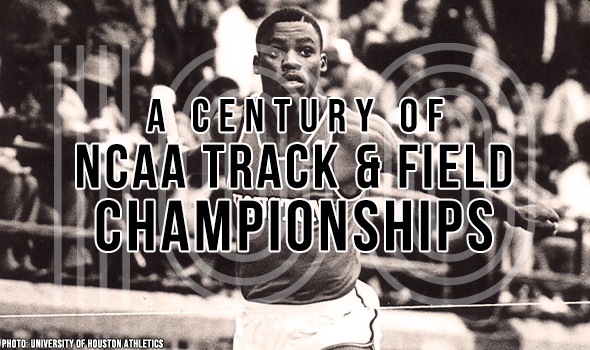
Track. Field. Houston’s Lewis Does It All!
On this day in 1981, Carl Lewis of Houston became the first athlete since Jesse Owens to win a track event and field event at the same NCAA Division I Outdoor Track & Field Championships.

UCLA Men’s 4×400 Clocks NCAA’s First Sub-3
On this day in 1988, the UCLA men’s 4×400 relay team became the first collegiate quartet to break three minutes, clocking 2:59.91 with Steve Lewis, Kevin Young, Danny Everett and Henry Thomas.
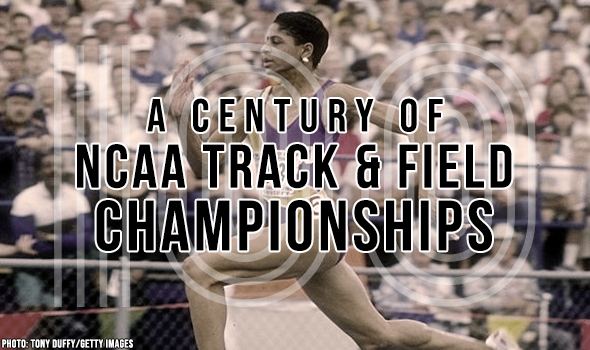
LSU’s Sowell Dominates 1989 NCAA Championships
On this day in 1989, Dawn Sowell of LSU culminated one of the most dominant performances in the history of the NCAA Outdoor Championships.

Givens’ Quad Leads Florida State to Team Title
On this day in 1984, Randy Givens of Florida State completed a remarkable – and still, unmatched – feat, winning a quadruple set of titles at the NCAA Division I Outdoor Track & Field Championships in Eugene, Ore.

Rono Rolls Into The Record Books
On this day in 1978, Henry Rono of Washington State became the first (and still only) man to set two different NCAA Championships meet records in distance races on the same day.
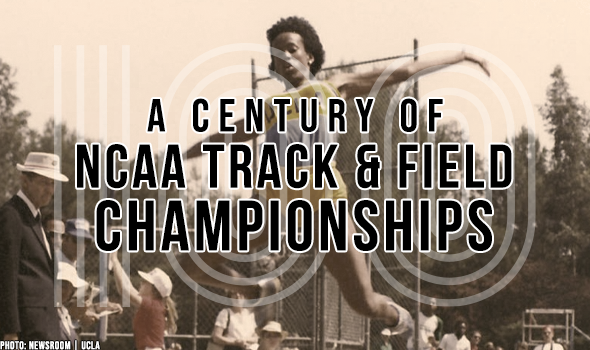
Jackie Joyner Doubles Down On Multi Crowns
On this day in 1983, Jackie Joyner of UCLA became the first woman to win an event twice at the NCAA Championships, claiming her second consecutive crown in the heptathlon with a then-collegiate-record-setting score of 6390 points.
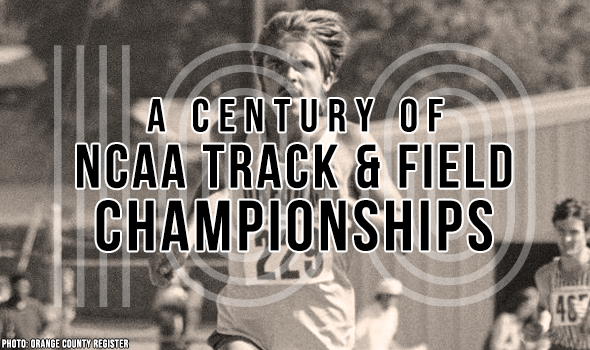
Connect Four: Prefontaine Makes History
Steve Prefontaine of Oregon became the first athlete to win titles in the same outdoor event four times, claiming the 3-mile/5000m from 1970-73.
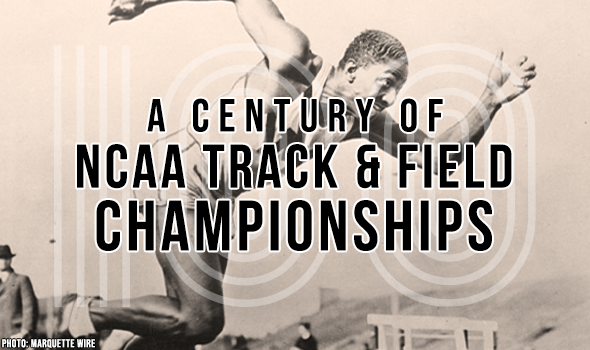
Ralph Metcalfe Is Mr. Triple-Double
Ralph Metcalfe, who was born on this day (May 29) in 1910, won three consecutive 100 and 200 titles while at Marquette from 1932-34, becoming the first athlete to win three NCAA titles in two separate events.

Georgia’s Orji Jump-Starts Record-Breaking Career
On this day in 2016, Keturah Orji of Georgia set her first collegiate record in the triple jump of 14.29m (46-10¾) at the NCAA Division I East Preliminary Round in Jacksonville, Florida.

